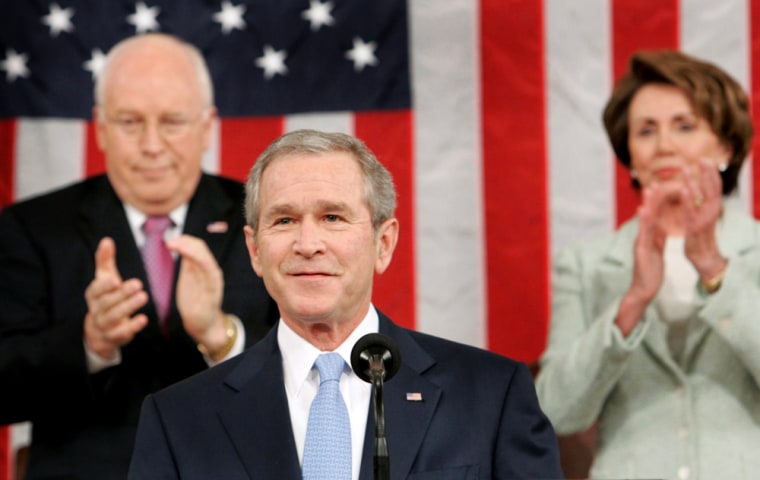President Bush wants Congress to give his controversial strategy for Iraq a chance to work. Defiant Democrats say they'll give it a vote, and use their newly won control over the House and Senate to oppose the deployment of an additional 21,500 troops.
"And we will continue to hold him accountable for changing course in Iraq," House Speaker Nancy Pelosi and Senate Majority Leader Harry Reid said Tuesday night in a blunt response issued before the applause had fully faded on Bush's State of the Union address.
His polls poor and public sentiment opposed to the war, Bush appealed to the Democratic-controlled Congress to work with him to face "difficult challenges and determined enemies" at home and overseas.
"First, we must balance the federal budget. We can do so without raising taxes," he said.
He urged lawmakers packed into the House chamber to send him legislation helping more Americans afford health insurance, reduce the nation's dependence on foreign oil, overhaul immigration laws and renew his signature No Child Left Behind education program.
Despite road trip, issue stays Iraq
Bush arranged a trip Wilmington, Del., for the day after his speech, eager to plug his energy proposals at a DuPont Co. facility where scientists conduct research on the use of plants in the production of biofuels such as celluosic ethanol.
But Democrats determined they would keep the public spotlight on the war, with the Senate Foreign Relations Committee expected to approve a nonbinding measure that rejects Bush's planned troop increase as "not in the national interest of the United States."
As is customary, Republicans cheered longer and louder than Democrats when Bush walked down the middle aisle of the House chamber to deliver his annual address to Congress and the nation.
But it was the Democrats' turn to whoop it up when the president remarked he was the first chief executive to "begin the State of the Union with the words Madam Speaker." Pelosi, seated next to Vice President Dick Cheney on the dais behind the president, smiled and reached down to shake his hand as members of her rank and file erupted in cheers.
And if there was only one president in the hall, his self-styled successors were sprinkled throughout the audience. One of them, Sen. Hillary Rodham Clinton, D-N.Y., sat one row behind another, Sen. Barack Obama, D-Ill., neither one giving any indication the other was nearby.
In power for the first time in a dozen years, Democrats have talked optimistically of finding common ground with the president and Republican lawmakers on immigration, education and other areas.
But they voiced concern with his proposal to subject a portion of some taxpayers' employer-provided health insurance to taxes, and were unenthusiastic about his proposals on energy.
"For me, the president's speech was more notable for what he didn't say on global warming than what he did say," said Sen. Barbara Boxer. The California Democrat advocates steps to halt the gradual rise in the earth's temperature. The president did not mention the subject as he called for greater domestic oil production as well as an effort to more than quadruple the nation's production of alternative fuels over the next decade.
The Iraq factor
The war is an issue apart - a conflict that helped Democrats win control of Congress in last fall's elections, and that leaves Republicans torn between a president of their party on the one hand and public opinion on the other.
Democrats chose Sen. Jim Webb of Virginia to deliver the party's formal televised response to the speech, and the former Republican Navy secretary and Vietnam veteran responded with a blistering attack on the president, the war and the consequences.
"The president took us into this war recklessly. He disregarded warnings from the national security adviser during the first Gulf War, the chief of staff of the Army, two former commanding generals of the Central Command," and more, Webb said.
"We are now, as a nation, held hostage to the predictable - and predicted - disarray that has followed."
Republican leaders generally expressed support for Bush's Iraq strategy. "If we fail in Iraq, or withdraw our troops prematurely, the terrorists will follow us home. Success is our only option," said Rep. John Boehner of Ohio.
But numerous members of the rank and file did little to hide their concern.
"To put more American personnel in harm's way without a realistic chance for success is something I'm not in favor of," said Sen. Arlen Specter, R-Pa. "And a realistic chance for success depends upon having the Iraqis with the will and the ability to fulfill their share of the bargain, and so far they have not."
In his own remarks, Bush was unequivocal.
"Whatever you voted for, you did not vote for failure," the president told lawmakers, many of whom were in Congress four years ago when he asked them to approve the invasion of Iraq. "Our country is pursuing a new strategy in Iraq, and I ask you to give it a chance to work. And I ask you to support our troops in the field - and those on their way."
Pelosi and Reid responded within minutes.
"While the president continues to ignore the will of the country, Congress will not ignore this president's failed policy. His plan will receive an up-or-down vote in both the House and Senate, and we will continue to hold him accountable for changing course in Iraq," they said.
